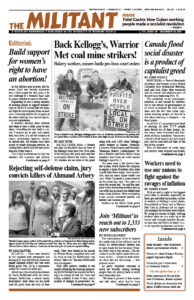With no end in sight to the biggest price hikes in decades, especially on food, gas and other necessities, strikes by workers at Kellogg’s cereal plants, ExxonMobil in Texas and at Warrior Met Coal in Alabama set an important example for workers everywhere. By using our unions to fight, striking workers show we can stand up to the bosses and struggle together for protection from the effects of today’s crisis of capitalist production and trade.
Employers are driving hard to jack up our “productivity” — an index of the exploitation of our labor — while holding wages down and increasing speedup and overtime, as working conditions and job safety deteriorate.
Running at 6.2%, government inflation figures have surged to their highest annual rate since 1990. In the past year major sources of protein — meat, poultry, fish and eggs — are up on average 11.9%. Beef prices have soared over 20%. Other items working people can’t easily skimp on — heating, lighting and fuel — are up 30%.
And the government aids the bosses’ drive to profit at our expense by faking cost-of-living figures, undercounting the real impact of inflation. Big retailers and food manufacturers get in on the scam, constructing ever more underhanded means to “raise prices without raising prices,” as a Nov. 21 Wall Street Journal article put it.
It detailed a long list of schemes used by producers and supermarkets, like shrinking the volume, hoping you don’t notice you pay the same but get less. They’re expanding buy-one-get-one-free “offers” that make you buy more than you need or want, to try to save money. The same products now often come in three different varieties — good-better-best. The “best” version is often just fancier packaging, but costs more. Supermarkets urge you to buy larger “economy-size” packages that, in fact, are often more expensive per ounce than smaller sizes.
For many online shoppers free-shipping thresholds have been lifted from $49 to $99. Warehouse clubs like Costco hike “membership” tabs while trying to undercut their rivals on prices, just as gym owners raise initiation fees and landlords hike administrative charges. None of these extra costs are ever included as part of the “price.”
Over 77 million people were being hounded by debt-collection agencies at the end of September. On Nov. 30 the government gave a boost to loan sharks who prey on working people by passing rules that allow these parasites to pursue debtors through email, texting and so-called social media.
In the face of the bosses’ offensive more workers are going on strike against paltry wage offers that are in fact cuts to real wages.
Fight for cost-of-living adjustments
Gains made in the recent strike by 10,000 United Auto Workers members at John Deere, which include a cost-of-living clause, should set off an “alarm bell,” warned the Wall Street Journal editors Nov. 18. COLAs raise wages every time prices rise, protecting workers’ living standards. They have been fought for by unions in previous decades and should be written into all contracts, including retiree pensions and government Social Security payments. And they should be based on what we really pay, not jury-rigged government statistics.
But the Journal editors complain these basic protections put “employers on the hook.” Extending COLA protections, they lament, will lead to “a wage-price spiral” and ongoing inflation. They try to convince workers we harm ourselves when we fight for higher pay or COLA.
These questions are not new. They were addressed by Karl Marx, a founder of the modern working-class movement, in the pamphlet Wages, Price and Profit. He explained where wages and profits come from, exposing bosses’ claims that pay raises lead to price increases.
Capitalist exploitation is founded on the fact that workers have no property and are forced to sell their labor power to the bosses to survive, Marx explained. Employers seize for themselves a portion of the wealth that our labor produces, constantly pushing for the largest possible share. This surplus value is the source of all their profits.
“The general tendency of capitalistic production is not to raise, but to sink the average standard of wages, or to push the value of labor more or less to its minimum limit,” Marx pointed out.
“If wages fall, profits will rise; and if wages rise, profits will fall,” he says, “but all these variations will not affect the value of the commodity,” which is the long-term basis for prices.
Bosses step up their drive to cut wages during times of rising unemployment when competition among workers for jobs sharpens. “If, during the phases of prosperity, when extra profits are made,” Marx writes, a worker “did not battle for a rise in wages, he would, taking the average of one industrial cycle, not even receive his average wages, or the value of his labor.”
Governments worldwide have printed vast amounts of money to try to buy their way out of today’s capitalist crisis and to aid their bosses to compete more fiercely with rivals abroad. This spurs demand, shortages and rising prices.
Keen to deflect responsibility for soaring gas prices, President Joseph Biden Nov. 23 blamed “large companies that have not ramped up the supply of oil quickly enough.” He announced he would release 50 million barrels of oil from government stockpiles. But crude-oil prices didn’t drop.
In the face of these conditions, growing numbers of working people are discussing and taking action to defend our class interests. Every step to extend solidarity with today’s labor struggles increases the possibility of workers scoring victories that provide an example to millions of what working people can accomplish.
The biggest step forward would be to broaden workers’ fight to take control over production and political power into our own hands. For that we need to break with the Democrats and Republicans and build our own political party, a labor party.

